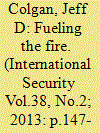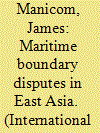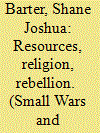|
|
|
Sort Order |
|
|
|
Items / Page
|
|
|
|
|
|
|
| Srl | Item |
| 1 |
ID:
124380


|
|
|
|
|
| Publication |
2013.
|
| Summary/Abstract |
What role does oil play in international security? While the threat of "resource wars" over possession of oil reserves is often exaggerated, the sum total of the political effects generated by the oil industry makes it a leading cause of war. Between one-quarter and one-half of interstate wars since 1973 have been connected to one or more oil-related causal mechanisms. Eight distinct mechanisms exist: resource wars, in which states try to acquire oil reserves by force; petro-aggression, whereby oil facilitates domestic political control of aggressive leaders such as Saddam Hussein or Ayatollah Ruhollah Khomeini; externalization of civil wars in petrostates; financing for insurgencies, such as Iranian oil money to Hezbollah; conflicts over potential oil-market domination, such as the United States' conflict with Iraq over Kuwait in 1991; control over transit routes, such as shipping lanes and pipelines; oil-related grievances, whereby the presence of foreign workers in petrostates helps extremist groups such as al-Qaida recruit locals; and as an obstacle to multilateral cooperation, such as when an importer curries favor with a petrostate to prevent multilateral cooperation on security issues. Understanding these mechanisms can help policymakers design grand strategy and allocate military resources
|
|
|
|
|
|
|
|
|
|
|
|
|
|
|
|
| 2 |
ID:
106358


|
|
|
|
|
| Publication |
2011.
|
| Summary/Abstract |
The impact of climate change on the circumpolar north has raised the profile of the Arctic Ocean to coastal states and presents serious foreign policy challenges. Chief among these is the pending delimitation dispute over the extended continental shelf between Canada, Denmark, the United States, and Russia. While delimitation disputes are not new to Arctic states, extended continental shelf claims are complicated by the existence of multiple claimants and a still developing international legal regime. To inform policymakers about what to expect from overlapping claims to disputed maritime areas, this paper draws comparative lessons for Arctic policymakers based on East Asia's experience responding to overlapping jurisdictional entitlements created by the UN Convention on the Law of the Sea (UNCLOS). East Asian states have been grappling with the challenge presented by overlapping claims to resource-rich seabeds since the region ratified UNCLOS in the mid-late 1990s. In light of similar geographic conditions (a dispute over a semi-enclosed sea), alliance structures and the relative infancy of the claimant states with UNCLOS entitlements-Canada only ratified the treaty in 2003, and the United States has yet to do so-this paper sets out the case that important comparative lessons can be drawn from the East Asian experience with maritime delimitation disputes.
|
|
|
|
|
|
|
|
|
|
|
|
|
|
|
|
| 3 |
ID:
115282


|
|
|
|
|
| Publication |
2012.
|
| Summary/Abstract |
The use of the phrase 'resource wars' covers an ever-widening list of categories that range from minerals and oil to rhino horn, timber and much more; anchored around this milieu are phrases like 'natural security' and 'environmental security'. While this proliferation has splintered the identity of the phrase 'resource wars', the more worrying impact is that it has allowed governments to ignore pressing problems related to biodiversity and the environment because the solutions are deemed too complex, time-consuming, and expensive with indeterminate outcomes. However, failing to address these problems not only increases the risk of conflict but also leads to a lack of trust in governments with the result that they risk being seen as 'the enemy of the people'. A first step to avoid this negative spiral should be to rethink the phrase 'resource wars'.
|
|
|
|
|
|
|
|
|
|
|
|
|
|
|
|
| 4 |
ID:
080787


|
|
|
|
|
| Publication |
2008.
|
| Summary/Abstract |
A clear understanding of what creates a conflict is central to building a lasting peace. This paper targets two common misconceptions which cloud analyses of the recent separatist conflict in Aceh. First, the conflict was not about oil. Resource curse theories help explain the creation of the Free Aceh Movement (GAM), but cannot explain why the conflict remained limited for several years. The lessons here are that what motivates a conflict varies over time and across groups. Second, despite Acehnese history, identity, and global trends, the conflict was not marked by Islam. Instead, the GAM promoted ethnic nationalism and downplayed religion to sustain the conflict and their control of it. The lesson here is how leaders can shape, but cannot determine the identity of movements. Beyond these two misconceptions, I move towards explaining the causal mechanisms of the Aceh conflict and assessing this model in light of post-Tsunami developments
|
|
|
|
|
|
|
|
|
|
|
|
|
|
|
|
|
|
|
|
|